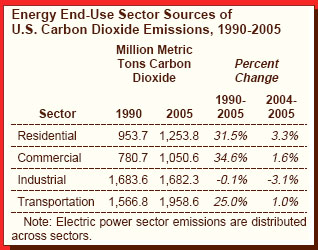U.S. greenhouse gas emissions rise 0.6% in 2005 to new record
U.S. greenhouse gas emissions rise 0.6% in 2005 to new record
mongabay.com
November 14, 2006
Emissions of heat-trapping gases, including carbon dioxide, methane, and nitrous oxide, rose by 0.6 percent between 2004 and 2005 according to a new report from the Energy Information Administration (EIA) of the U.S. Department of Energy. Since 1990, such greenhouse gas emissions have climbed by 16.9 percent. The Kyoto Protocol calls for a 7 percent reduction in emissions levels below 1990 levels by 2012.
For the year, anthropogenic emissions of greenhouse gases reached 7,147 million metric tons, a new record.
The EIA report notes that while U.S. emissions has averaged 1 percent growth over the past 15 years, the American economy has become more carbon efficient, with economic growth outpacing emissions growth.
“Since 1990, U.S. emissions have increased more slowly than the average annual growth in population (1.2 percent), primary energy consumption (1.1 percent), electric power generation (1.9 percent), or gross domestic product (3.0 percent),” said the report, titled “Emissions of Greenhouse Gases in the United States 2005”.
US Energy Use
|
The report says that 83 percent of total U.S. greenhouse gas emissions consisted of carbon dioxide from the use of fossil fuels including coal, petroleum, and natural gas, while 8.6 percent consisted of methane and 6.1 percent came from nitrous oxide. The transportation section was the largest producer of carbon dioxide emissions (32.6 percent of emissions), followed by industrial (28 percent), residential (20.9 percent), and commercial (17.5 percent)
Rising concentrations of carbon dioxide, which now stand at the highest levels in at least 650,000 years, in the atmosphere are blamed for climbing global temperatures. Scientists have warned that continued increases in CO2 levels could have dramatic impacts on sea levels, ocean currents, weather patterns, and precipitation.
Earlier this week environmental groups ranked the United States as one of the countries doing the least to fight global warming.